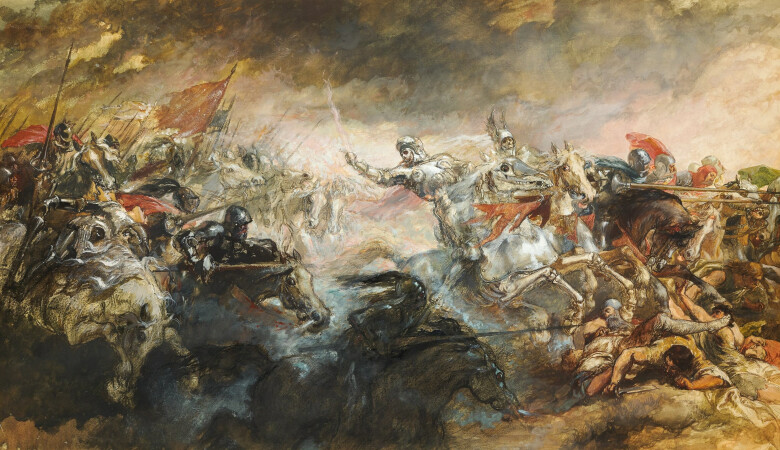Don't Be Ashamed (2 Timothy Sermon 2 of 9)
October 11, 1998 | Andy Davis
2 Timothy 1:8-18
The Gospel, Persecution
I. Introduction: 1630 in Massachusetts and Japan
I'd like to ask that you turn in your Bibles to 2 Timothy, as we continue our series in 2 Timothy: Boldness and faithfulness in preaching the Gospel. On March 22, 1630, an English Puritan leader named John Winthrop, stepped on a ship called the Arabella, and began a voyage crossing the Atlantic Ocean with 11 other ships. 700 Puritan fellow-worshippers, 240 cows, and 60 horses, it was the largest migration from England to the New World up to that point. Now they were leaving England and coming to Massachusetts, as a matter of fact, to found a colony, the Massachusetts Bay colony, the basis of which would ultimately establish our government. Now, they were coming to establish a government which was based on their own convictions, but later, came religious freedom in our country. And if any of you study history, you know that it was really some Baptist leaders that espoused the principles of separation of church and state.
However, as a result of that legacy, we have generations of Christians who have never known what it means to suffer, I mean, really suffer, for their faith. All around the world today, there are, however, people who are suffering because they are Christians, people who are in prison, people who are dying, who have lost property. As a matter of fact, more people have suffered in this century, that kind of persecution than all the other centuries combined.
Now, at the same time that Winthrop stepped on that ship to begin his journey, and halfway around the world, there was a handful of Japanese Christians who were suffering that kind of persecution. The Japanese government at the time, a military government, hated Christianity and looked on Christianity as a foreign import, somewhat like a tumor that needed to be cut out. So what the government did was, they put a picture of Jesus Christ or of the cross on the ground and gathered the local populace and they had the people walk on the picture. Their theory was that no true Christian would ever walk on a picture of Jesus Christ or on His cross. And between 5,000 and 6,000 Japanese Christians refused to walk on that picture. They were then tortured and put to death.
Some historians believe that that persecution represented the greatest percentage of Christians who ever died for their faith in all of church history, because there really weren't that many more Christians than that in all of Japan. Now, when we were missionaries in Japan, we actually went to visit one of the places where they were held before they died. Some of them actually were pushed over a cliff and they died, they were dashed on the rocks below. And before they were pushed, they prayed and they said, "Lord Jesus, receive our spirit." Now, any of you who know the Book of Acts, know that that's exactly what Stephen prayed before he died. And so there is a heritage of suffering, persecution for our faith.
We as Christians in America, however, are somewhat ignorant of that heritage, of that connection between bold and faithful witness to Jesus Christ, and the suffering of persecution. However, any of us who have tried to be faithful witnesses for Jesus Christ, whether to our friends, to our family, co-workers, we know the sting of persecution perhaps at a lesser level. Any of you today who are thinking of non-Christians you'd like to witness to, thinking of people you'd like to share the Gospel with, perhaps there's something inside you that holds back a little bit. There's some fear or lack of boldness.
Our passage this morning addresses that fear. I think it's one of Satan's greatest weapons in preventing the advance of the Gospel. And we as members of First Baptist Church, we as Christians, we need to understand the principles of 2 Timothy and of other scriptures, so that we can push past that barrier of fear and be faithful and bold in preaching the Gospel.
What I'm going to do is, I'm going to read beginning at verse 6, we're going to read to the end of the chapter. I'm going to begin my discussion at verse 8, but I want to get a running start into the passage. So let's start at chapter 1 of 2 Timothy verse 6, and following.
"For this reason, I remind you to fan into flame the gift of God which is in you through the laying on of my hands. For God did not give us the spirit of timidity but of power, of love, and of self-discipline. So, do not be ashamed to testify about our Lord or ashamed of me, His prisoner, but join with me in suffering for the Gospel by the power of God, who has saved us and called us to a holy life, not because of anything we have done, but because of His own purpose and grace. This grace was given us in Christ Jesus before the beginning of time, but it has now been revealed by the appearing of our Savior, Christ Jesus, who has destroyed death and brought life and immortality to light through the Gospel. And of this Gospel, I was appointed a herald and an apostle and a teacher. That is why I'm suffering as I am. Yet, I am not ashamed, because I know Whom I believed, and I'm convinced that He is able to guard what I've entrusted to Him for that day. What you have heard for me, keep as the pattern of sound teaching with faith and love in Christ Jesus. Guard the good deposit that was entrusted to you. Guard it with the help of the Holy Spirit who lives in us. You know that everyone in the province of Asia has deserted me including Phygelus and Hermogenes. May the Lord show mercy to the household of Onesiphorus because he often refreshed me and was not ashamed of my chains. On the contrary, when he was in Rome, he searched hard for me until he found me. May the Lord grant that he will find mercy from the Lord on that day. You know in how many ways he helped me in Ephesus."
II. Overview of the Chapter
Now, in this first chapter, there are three charges that Paul gives to Timothy. Now let's understand again the context, which I explained last week. Paul is in prison, in a Roman prison, because he's suffering under the persecution of the Roman Emperor, Nero. Now Nero was a madman, he was crazy, and he had burned half the city of Rome and decided that he would blame it on the Christians. Now, it's fascinating to me at that early stage in the mid-60s that Christianity had already made such an impact on Rome that he could blame such a large thing on the Christian body. The Gospel had had already permeated Rome to a great degree. The power of the Gospel is awesome, and in just one generation, it already reached the heart of the empire, the city of Rome. But Nero began this persecution, and Paul would eventually die under it.
Paul was sitting in a prison, somewhat like a dungeon, a hole in the ground, with a little light above... A little hole above him for light and for air, and he was writing a final letter to his friend Timothy. He was preparing him to receive a serious Gospel charge. Paul had finished his work, and he knew he was about to die. He now wanted to commit the ministry over to Timothy. Timothy was his young lieutenant, his right-hand man, and the time had come for Timothy to step up and take the responsibility of leadership in those New Testament churches. And so he's going to give him throughout this letter, not just here in this first chapter, but throughout this letter, a series of charges to get Timothy ready for that serious commitment of carrying on the Gospel.
Now the first charge, we talked about last week, mainly that in verse 6, that Timothy should fan the fire or the flame of the Spirit, the gift of the Spirit that is in him, the gift, the spiritual gift, of preaching and teaching the Gospel. And then he says, "Timothy, God has given you the power of the Holy Spirit to accomplish everything that God has given you to do." And that spirit is not a spirit of cowardice. That's really how I used to translate verse 7, "God has not given us the spirit of cowardice, but a spirit of power, of love, and of self-discipline." And so, for that reason, Timothy, I'm charging you: Don't be ashamed of Jesus Christ, and don't be ashamed of His testimony, and don't be ashamed of me." So that's his second charge, and that's the one we're going to spend time with this morning. Next time I preach, not next week, but two weeks from now, I'll be talking more specifically about verses 13-14, the charge that Paul gives Timothy to guard the message of the Gospel. It's going to be a very important sermon.
III. Paul’s Second Charge to Timothy: Don’t Be Ashamed of Christ (vs. 8-12, 15-18)
But today we're going to talk specifically about Paul's charge to Timothy, that he not be ashamed of Jesus Christ. Now the context of course, is one of persecution, as I've mentioned. And we have to ask the question, why does the world persecute Christians? And also, how does the world persecute Christians? Well, the question, "why does the world persecute Christians?" has already been answered by our Lord Jesus Christ. When Jesus was getting His disciples ready the night before He died in John 15:20, He said, "Remember the words I spoke to you. No servant is greater than his master." Do you hear that? "No servant is greater than his master. If they persecuted Me, they will also persecute you." If you are a Christian, you are under a master, and that master is Jesus Christ. If they treated the head of the house like Beelzebub, the king of flies or prince of demons, if they handled Jesus or treated Jesus that way, how are they going to treat you? Any better? Can you expect to be treated any better?
In John 15:20, Jesus said that we must expect persecution because they treated him that way. Well, the question we have to ask then is, why did the world treat Jesus the way it did? John's gospel answers that as well. In John 3:19-20, Jesus says this: "This is the verdict. Light has come into the world, but men love darkness rather than light because their deeds are evil." Do you hear that? They love the darkness because they want to continue living the kind of lives that they live. We live now in a dark world, a world full of people who want to continue to live in darkness. If we bring the light of Jesus Christ, they will hate us the way they hated Jesus. It's the same thing, they want to keep on living the way they've always been living: In darkness and in sin. And so they persecuted Jesus.
In John 7:7, Jesus spoke to His brothers, and His brothers at that point did not believe in Jesus. And they were somewhat arguing with the way Jesus was going about his ministry. And so, Jesus said in John 7:7, "The world cannot hate you, but it hates me, because I testify that what it does is evil." Now, you can see now why the world persecuted Jesus Christ, because he always told the truth. What's interesting in that passage in John 7:7, is that Jesus really was rebuking his brothers, even though they didn't know it. He was saying, "The world can't hate you. It's impossible for the world to hate you, because you belong to the world. And so, the world will love you, it will welcome you, it will be kind to you. But the world can't welcome me, because I don't belong to it, and so, I'm going to be persecuted."
Now, ultimately, Jesus' brothers did believe, and so the world could hate Jesus' brothers. Now, the question I have to ask the First Baptist Church is, "Can the world hate us?" Can the world hate us or is it impossible for the world to hate us, because we belong to the world, we're just like the world. We talk like the world, we eat like the world, we entertain ourselves like the world, we're no different than the world. And so the world loves us and accepts us as its own. May it never be. We have to be so radically different that the world can hate us. And that the world rejects us because of the light we bring, the Gospel message we bring.
Martin Luther is one of the boldest men in the history of the church, gave us this charge and this is a beautiful thing, I like to think about this. He said, "We should always preach the Gospel message the way Jesus Christ did, so that after our preaching, men who have heard us will either hate us or hate their sin." Did you hear that? We should always preach the Gospel, so that when we finish preaching, men will hate us as the messenger or hate their sin. Faithful Gospel Ministry always produces two things, converts to Jesus Christ, and persecution, always. And when I see those two things flowing into this church, I will rejoice, because I know we're being faithful to the Gospel message He's given us.
We are to be in effect, a fork in people's road. When they come along to a member of First Baptist Church, when they come to us, they have a decision to make. They come to a fork in the road. We shouldn't be one that makes no impact whatsoever on the flow of their life, but we are a fork in their road. We preach the Gospel to them, we explain to them the danger that they're in apart from Christ. And the eternal life that God promises them, the fullness and the richness, "I've come that they may have life and have it fully," and we present it, we lay it out openly for them. Come out of your sin, come out of the darkness, come into Jesus Christ and know His peace and His forgiveness. We're offering them such a message of forgiveness and a power, but we're also telling them to repent, because the Gospel is a command to repent. Well, guess what? We're going to be a fork in their road, and at that moment, they're either going to hate their sin or they're going to hate us, and that's when the persecution starts.
How the World Persecutes
Now, we have to ask, secondly, how the world persecutes? And I've noticed in my own life, the world tends to persecute in two levels or perhaps two stages.
Level One: Societal Rejection
The first level, you could call societal rejection. Society begins to spit you out, reject you. Doesn't want you. It doesn't like you. They begin to avoid you or ostracize you, make fun of you, tell jokes about you. They don't include you in their company, they go out to lunch, and they don't ask you. Now, they just don't really want to be around you. I remember early in my own Christian life, I'll never forget this. I was led to Christ by a guy in my fraternity when I was at MIT. And at first I liked to be around him, I guess, but as it went on, he seemed strange and I felt funny around him. He wasn't doing anything other than just living a Christian life in front of me, and inviting me to Christian meetings and doing various things, but I started to dislike being near him. And it got to the point where he would come and sit near me at dinner and I would get up and go over and put my plate down, and I'd come back and I'd get my fork and knife and get it and put it back, and I'd come back and get my glass and put it down. What a rebuke! And Steve just bore it all patiently.
But in a way I was saying, "I really don't want to sit near you. I don't want anything to do with you." That was me. Someday, I would be on the other side of that, once I began to preach the gospel. But I praise God for Steve's faithfulness and he never gave up, and he kept inviting me, kept praying for me and ultimately, I came to Christ. Why is this such a powerful persecution? Why is it that societal rejection matters to us? It's because of who we are as human beings. We like to be together. We like to have friends, don't we? We like to enjoy times. That's why as Christians, we enjoy fellowship together. But from a very early age you can see people, little babies, who like public acceptance.
I remember, Nathaniel, my son, when he was, oh, about 18 months old, we were in a small group Bible study in my home and there was a group of about 15 people and we used to meet in our homes for Bible study. We had a wonderful time. And he was there with us and he was sitting on the lap of one of the people in the study, and he said, something or did something, I can't remember what it was and everyone laughed. And I saw the look on his face, I was watching him and he was looking around and he felt happy and he did the same thing again. Do you know why he did it again, because he wanted to be liked. He wanted to be included, to be part of the group. Well, God has put that inside us, there's just nothing wrong with that. The problem comes when we put it above our call to be Christian witnesses. And when the world begins to reject us, it stings. And nothing's going to take that sting away, it's going to hurt when somebody turns away and walks away from you. But that's the first level of rejection.
Level 2: Active Opposition
The second level however, is a level that I would say most of you have never faced. It's active persecution. Maybe physical attack, on your life, on your possessions, on your livelihood, on your freedom, on everything you are, because you're a Christian. Now, as I said, many of us have not experienced that, but it is going on all over the world, it's going on in China. It's going on in parts of Russia, it's going on in India, it's going on in Pakistan. I've seen a lot of these places, where people are... They lose their job, they lose their homes, they lose everything that's dear to them, because they're Christians. Now, Christ called to the church for the first level of persecution. He says to us, "Don't be ashamed. When society begins to reject you, you're tempted to be ashamed, don't be ashamed."
For the second level, a more aggressive persecution, He says, "Don't be afraid." These are the two commands he gives us. Now, as I sense that society and culture is getting more away from Christian principles, have you seen that in our society? I would say, if we use our imagination within two... Maybe one or two generations, the kind of persecution we see in China may happen in our country, I don't know. We need to be ready for it, get our children ready for it, our disciples ready for it. But that's not going on right now for the most of us. We have to face shame, the temptation to be ashamed and we have to deal with that properly.
3 Types of Shame
Now, I think there are three types of shame. We are tempted towards three types of shame by Satan.
- Ashamed of the name of Christ
The first is that we are tempted to be ashamed of the name of Christ. Now, if you look at Verse 8, he says, "Do not be ashamed to testify about our Lord, or ashamed of me as prisoner." So we're tempted to be ashamed to testify about the name of Jesus Christ.
- Ashamed of the people of Christ
The second temptations, we're tempted to be ashamed of the people of Christ. He says, "Do not be ashamed of me as a believer, as a messenger of the Gospel." And we're tempted to be ashamed of the people of Christ, want to stay away from them in times of persecution.
- Ashamed of the gospel of Christ
And the third is, we're tempted to be ashamed of the Gospel of Christ. We're tempted to be ashamed of all three.
Overcoming Shame
Now, most of the time with temptation, we want to do what? We want to run away from it, we need to get away from it. Flee temptation, right? Flee. And it's good, it's good to get out of temptation. In the Lord's prayer, it says, "Lead us not into temptation," right? "And deliver us from the evil one." Can we escape this temptation though in a Godly way? I don't think so. I think it's impossible, actually to escape the temptation. Because the only way we can escape it is to stop preaching the Gospel. We can't do that, we've got to face this and we have to deal with it properly. Now, Jesus said in Mark 8:38, "If anyone is ashamed of Me and of My words in this adulterous and sinful generation, of him will the Son of Man be ashamed when He comes in His Father's glory with His angels." And do you see what Jesus is calling us to? He's calling us to look ahead, to look to the future. When Jesus comes in mighty power as a king and sets up His reign, we're called to look ahead to that time. We don't want him to be ashamed of us, so we cannot be ashamed of Him. Jesus is lifting our eyes above it.
And here in these Verses, Paul gives us all the help we need to overcome shame in these three ways. To overcome shame of the name of Jesus Christ. To overcome shame of the People of Christ being associated with the people of Christ. To overcome shame of the message of the Gospel. The first in Verse 8, he says, "Join with me in suffering for the Gospel. So do not be ashamed to testify about our Lord or ashamed of me, as prisoner, but join with me in suffering for the Gospel," verse 8.
Now, in the original language there's a sense there of taking on your portion, taking on your share of suffering. Be a fellow partaker with me in this suffering. If you are a Christian, you have a portion of Jesus Christ suffering to bear. You can't escape it and be faithful to him. And why do I say that? Numerous verses, I quoted this one last week, Philippians 1:29. "It has been granted to us on behalf of Christ, not only to believe in Him, but also to suffer for Him." You get them both together. If you believe in Jesus, you're also granted a portion of his suffering.
Also in Acts 14:22, Paul said to a small church, they're strengthening them, getting them ready for the journey. It's going to be a hard journey into heaven. He says in Acts 14:22, he says, "We must go through many hardships to enter the kingdom of heaven." I feel like I have to persuade American Christians of this. I don't have to persuade Chinese Christians of this, they know. We have to go to Heaven through many hardships and difficulties, but we're not used to it, we have to be ready for it, and we have to expect it.
Everyone who wants to live a Godly life Will be Persecuted
In 2nd Timothy 3:12, right in the book we're studying. "Everyone who wants to live a Godly life in Christ Jesus will be persecuted." Have you ever noticed that that's a promise? I've seen Christian book stores, books of 100 Promises or a thousand promises from God. I've never seen 2 Timothy 3:12 in there. Do you all notice that? It seems kind of gloomy, but it actually is very realistic. Everyone who wants to live a Godly life in Christ Jesus will be persecuted. Can I ask you First Baptist Church, do you want to live a Godly life in Christ Jesus? If so stand under Verse 12 of Chapter 3. That's the call that we have from Jesus Christ. Paul's portion is our portion, Christ's portion is our portion. Understand that. Be ready for it. The second is to focus on God's power.
He says, join with me in suffering for the Gospel, by the power of God. By the power of God. Can you stand up under a world system, which under Satan, his sole purpose is to keep you quiet, to shut your mouth from preaching the Gospel, can you stand up under that by yourself? Absolutely not. But with the power of God inside you, you can do anything. "I can do all things through Christ who strengthens me," says Paul. And that includes preaching the gospel in this sinful world. Join with me in suffering for the Gospel, by the power of God. God's power is an awesome thing. And we as the church, we should be demonstrating His power in the way we live our lives. Why in the world should we be ashamed of Jesus Christ, when He is the most perfect man who's ever lived. He led a sinless life, He died on the cross for others, for their sins, and He rose with power on the third day triumphant and over death. How could we ever be ashamed of that? Ashamed of Jesus Christ, who someday is going to come in the heavens, He's going to part the heavens, and He's going to come down with a display of power such as the world Has never seen. And we are His children, we belong to Him.
We belong to Him and His power is in us. We're ambassadors of the king. It's the world that needs to be ashamed of its sin, and someday it will be ashamed as it stands before the judgment seat of God. But we are free from all that. Join with me in suffering, he says, by the power of God. Well, let's understand that power though. Is this a power that takes away all those feelings OF butterflies you get when you go to your neighbor to share the Gospel? Is that what the power of God does? No, the power of God doesn't take away those butterfly feelings. The power of God enables you to preach the Gospel, anyway. And then when you're done, you rejoice that those Satanic traps did not trip you up. It doesn't take away all the sting, it doesn't take away all the trouble, it just gives you the power to push through the barrier.
Now listen to this, 1 Corinthians 2:3-5, here's the mighty Apostle Paul, powerful, he says, right? Now only with the power of God. 1 Corinthians Chapter 2, he said, "I came to you in weakness, and in fear, and with much trembling." He says. "My message in my preaching were not with wise and persuasive words, but rather with a demonstration of the Spirit's power. So that your faith may not rest on men's wisdom, but on God's power." Weakness, fear and trembling, the power of God conquers all. It does not take it away, it enables weak, simple people like us to be faithful anyway. That's the power of God. "Join with me and suffering for the Gospel, by the power of God." He says.
The third point he makes is that we need to study role models, both positive and negative. Now, I'll start with the negative. In Verse 15, he says, you know that everyone in the province of Asia, has deserted me, including Phygelus and Hermogenes. Let me ask you a question, have any of you ever heard of Phygelus and Hermogenes? Any of you know anything about them? No? I don't know anything about them, either. I can tell you I've studied the New Testament from one side or the other and there's only one mention of Phygelus and Hermogenes in the whole scripture. Do you know what that mention is? Right here. Their shameful desertion from Jesus Christ.
Do you want that written about you in the book of life? Shameful deserter of Jesus Christ. Study negative role models and say, "I don't want to be like that. I don't want to be like Phygelus and Hermogenes. Here's another one, 2 Timothy 4:10, "Demas," he says, "Because he loved this world has deserted me and has gone to Thessalonica." Why did Demas desert him? Because he loved this present world. "He has deserted me and gone as Thessalonica." Do you want to be a deserter, because you love this present world? No. And how about this one, Verse 16 of Chapter 4. "You know at my first defense, no one came to my support. Everyone..." What? There's that word again, "deserted me. May it not be held against them." Negative role models. Well, thanks be to God, There are positive role models here too.
The Apostle Paul, he says, "Join with me in suffering for the Gospel." In Verse 12, he says, "I'm suffering because I'm a herald, an Apostle and a teacher. Join with me and be like me." Timothy, I'm not asking you to do anything that I haven't modeled for you. Join with me. And then there's Onesiphorus. Onesiphorus was a Christian layman who came from Ephesus, made a long journey, perhaps a business trip to Rome, but when he was there, he made it his business to search hard for Paul until he found him. And he did find him and he ministered to him, he refreshed him, maybe brought him some food, maybe some clothing. He prayed with Paul.
Now, why was that so courageous? It's because, it was a time of persecution under Nero. Onesiphorus was linking himself to Paul, as a Christian. And he was saying, in effect, I too am a Christian. He was willing to bear up under that, and so Paul prays for Onesiphorus family, who he left behind in Ephesus to come and minister. God take care of them, because Onesiphorus has been faithful and he may well soon be suffering for his faithfulness. Positive role models. Stare at them. Covet their faith. Covet their boldness, want to be like them.
Called to be Holy
Also, review your calling, review your calling. In Verse 9 and 11, in Verse 9, he says, "God has saved us and called us to a holy life, not because of anything we've done, but because of His own purpose and grace." You are called to be holy.
Now, what does it mean to be holy? We tend to think of holiness in terms of not sinning. I think of holiness in terms of separation, we're called to be separate from this world, to be different from this world. As you walk in holiness, and in Jesus Christ, you're going to be different from the people around you. Remember your calling, you're called to be holy. But you're also called to be faithful in preaching the Gospel. Be faithful in preaching the Gospel. Paul says, "I was appointed as a herald and an apostle and a teacher." That's my calling, and with it comes to suffering. And in Verse 12, remember your reward.
Now, some people say, personal reward should be no motivation for Christian service. I don't think that's true. If that were true why would Jesus have said this to us in the Sermon on the Mount, "Blessed are you when people insult you, persecute you and falsely say all kinds of evil against you because of me. Rejoice and be glad, for great is your reward in heaven, for in the same way they persecuted the prophets who were before you." That's what Jesus promised, any who are willing to stand with him and to suffer with them to preach the gospel. Rejoice and be glad he says, for great is your reward in heaven. Think about that reward. Paul says, "Henceforth there is laid up for me a crown of righteousness, which the Lord will give to me, and not only to me, but also to all who have longed for his appearing." All of us can have that crown of faithfulness in service to Christ.
Paul himself says in this epistle, if we died with Him, we will also live with Him. If we endure, we will what? Reign with Him, what a promise. And my feeling is as we stare at the future, as we understand what Jesus Christ Has promised us, we will be faithful to preach the gospel. But more than anything, we have to know Jesus Christ and the glory of Christ. He says, "I know whom I have believed, and I am convinced that He's able to guard what I have entrusted to Him for that day." Jesus Christ is a glorious king, and He is the one who calls us to be faithful. And He's the one who will reward us on that final day. Paul says, "He is guarding everything I passed up to Him," years of service, times of being faithful, going to my neighbors, going from door to door in various cities and preaching the gospel. Every one of them Jesus treasures, He's holding on to it, and on that final day he's going to reward me. He's guarding what I've entrusted to him for that day.
And not only that, He's with me. "At my first defense, no one came to my support, but everyone deserted me. May it not be held against them. Yet the Lord, stood at my side and gave me strength. So that through me the message might be fully proclaimed and all the Gentiles might hear it." That's what Paul said. Jesus Christ was faithful to me and gave me the strength, as you meditate and fix your eyes on Jesus, you will have the boldness and the power to preach the gospel. Hebrews 12 says that we should "fix our eyes on Jesus, the author and perfecter of our faith who for the joy set before Him, endured the cross, scorning its shame, and sat down at the right hand of the Majesty on high." Jesus scorned the shame of this world because it's a shameful thing. And he said, "It means nothing to me. If only I may be faithful to my father to finish the work that he's given me to do, to die on the cross for sinners." Let us have the same attitude as Jesus Christ and Paul.
Origin’s Zeal for Martydom
I want to finish with a story that I read from church history. It's a story of a 17-year-old boy. He lived in Alexandria, Egypt. His name was Origen and his father was about to die as a martyr for Jesus Christ. Origen wrote his father a letter and exhorted his father. 17-year-old boy, he wrote a letter. Leonides was his father's name, and he said, "Be faithful to Jesus Christ right to the end and he will give you a crown of life, Revelation." He said, "Don't give in, but be faithful." And his father did die in that persecution. Origen himself wanted to die in that persecution as a witness, a testimony, as a martyr for Jesus Christ. But his mother hid his clothes. He looked everywhere for his clothes and couldn't find them. And he had a different kind of shame at that moment, didn't want to run out into the streets without his clothes. And so his mother hid his clothes, and he couldn't go out and give his life. However when he was 69 years old, he did give his life in persecution under a different Roman emperor. Origen's zeal inflames me. I want to be like that. I want to have the same passion to preach the gospel that transcends any fear I might have of societal rejection, or even a physical danger. I'm praying that for each one of you.
We come now to the time of our service that we call an invitation. I've given to each one of you who are Christians today a charge, the same charge that Paul passed to Timothy, God is inviting you to be a faithful and bold witness to Jesus Christ. This is a time for you as Christians to commit yourselves again to preaching the gospel, perhaps to your neighbors or at your work. To be willing to stand with Jesus in this world system that stands so opposed to God. But there may be some here today, who have never given their lives to Jesus Christ. The gospel has been preached this morning in part. Jesus Christ died on a cross for sin. And He can take away from you all of your shame before God if you'll just give your lives to Him. There's going to be a moment, Reverend Scott Markley is going to be standing in front, you can come and say to him, "I want to become a member of this church or I want to give my life to Jesus Christ." For all of us, may we be faithful to the command that He has given us to believe the gospel and live it out.









